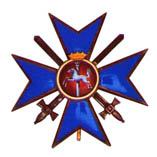|
Collecting, especially in regards to
valuable objects, should be based on knowledge. To that
end, these eight golden rules about collecting serve as
a guide:
1. Knowledge is power!
As a beginning collector, you should spend at least 15
to 25 per cent of the amount you are planning to invest
in your collection in literature. The more you know
about your collecting field, the less your collection
will cost you in the long term. Join an association that
is related to your hobby; buy special magazines and
books. Books and articles that are out of print can be
copied from other collectors.
Old auction catalogs are especially interesting since
they often show mass, manufacturer data and weights of
medals, which can be useful for comparison. Literature
in the form of rank lists and state manuals gives
information on the award’s number of medals. A piece
that was awarded only three times is perhaps obtainable
on the medal market only every 20 years – or never.
Shown on the left is an officer’s cross of the
Braunschweig House Order of Henry the Lion with swards.
That is such a piece. With only three proven awards, it
belongs to the extra rare decorations in this area. Due
to the very late award, related to the entire award
period in the first World War, it probably was only
manufactured by the court jeweler Hermann Jürgens.

2. Specialize!
Few people can afford to collect everything. As a new collector,
therefore, you should specialize early. Decide what you
want to collect. There are many possibilities.
Specialize, for example, in a topic like lifesaving
medals or medals for art and science or those for one
German state.
3. Collect from above downward!
Do not buy 20 medals at $50 each, but rather one for $1,000. The less a
medal costs, the more common it is, and the simpler to
buy it. Rare pieces, however, come up infrequently. If
you have the opportunity to buy a rare piece, give
preference to it instead of buying several cheap and
common pieces. That rare medal may never again be
offered to you. Ask yourself, in this context, how much
you want to spend on your hobby each year.
4. Examine each piece carefully!
At collectors’ meetings and fairs, you should examine each piece that
might be connected to your field of collection. Try to
remember technical peculiarities of the different
medals; note the differences of the pieces. Inform
yourself about the applications to the medals, like oak
leaves, swords, crowns, brilliants and so forth. World
War I medals were made in a perfect way, even those
manufactured only in silver gilt instead of genuine
gold.
5. Keep in contact with collector colleagues!
There are many other collectors who collect the same as
you. Many of them are trustworthy and already have some
experience in their area of expertise. Meet them and try
to benefit from their knowledge.
Collectors meet in societies:
The
German Orders Society, DGO e.V. http://www.deutsche-gesellschaft-fuer-ordenskunde.de/

Orders and Medals Research Society OMRS:
http://www.omrs.org.uk

Orders and Medals Society of
America OMSA:
http://www.omsa.org/

Österreichische Gesellschaft für Ordenskunde (ÖGO): http://www.ordenskunde.at/

6. Speak to visitors at Collectors'
Meetings !
You might get the best things for your collection from
your collecting colleagues. Many collectors bring their
duplicates to collectors’ meetings – you chance to
get something you may have been looking for for a long
time. Furthermore, the meetings give you the chance to
meet more experienced collectors.
7. Do not believe everything someone tells you!
For most pieces, particularly rare ones,
a history is given, which makes doubtful pieces better
for sale. Trust only your own knowledge. A history may
be fast invented for each piece.
8. Study, study and study some more!
Never stop studying. The most experienced collector
learns constantly. Talk with collector colleagues, and
look at everything in their collection that you can.
9. Be careful with every purchase!
If you see something you absolutely have to have –
something you’ve been looking for for eternity – be
extra careful. You will fool yourself more thoroughly
than any dealer, right after the phrase “greed makes
blind.”
Always keep in mind that as long as something is
collected, fakes will be made. |





